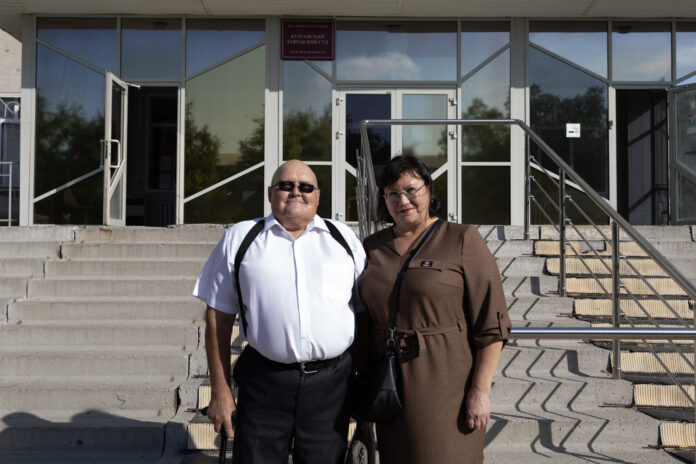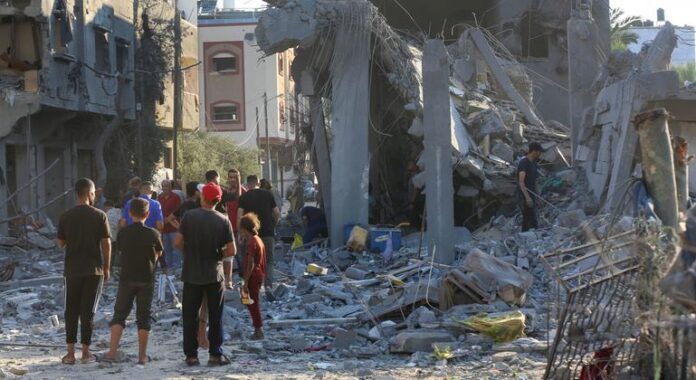OHCHR spokesperson Jeremy Laurence said UN Human Rights High Commissioner Volker Türk “is shocked and appalled” by comments made by Israeli finance minister Bezalel Smotrich, who suggested that letting two million Palestinians in Gaza starve to death could be “justified and moral” in order to free hostages.
The High Commissioner condemned these words in the strongest terms, which also incite hatred against innocent civilians.
Risk of incitement
Mr. Laurence explained that the starvation of civilians as a method of warfare and the collective punishment of the Palestinian population are both war crimes.
“This direct and public statement risks inciting other atrocity crimes,” he said. “Such statements, especially by public officials, must cease immediately. They must be investigated and if found to amount to a crime, must be prosecuted and punished.”
Mr. Laurence also reiterated OHCHR’s long-standing appeal for an immediate ceasefire in Gaza, the release of all hostages and increased humanitarian aid flows into the enclave.
“This is an immediate call to the Israeli authorities that it is their responsibility to monitor this behaviour,” he said. “Beyond that, let’s take it one step at a time. That is the first stage. It is the Israelis’ responsibility.”
‘Exodus’ from Khan Younis
Meanwhile, the effects of the latest evacuation order in Gaza are already “very visible”, a senior communications officer with the UN agency that assists Palestine refugees, UNRWA, said on Friday.
Louise Wateridge spoke to UN News a day after the Israeli military issued the directive, forcing thousands to flee eastern and central Khan Younis and the Al Salqa area of Deir Al-Balah.
Ms. Wateridge was in Khan Younis on Thursday afternoon and witnessed hundreds of families heading west in temperatures that surpassed 30 degrees Celsius (86 degrees Fahrenheit).
“The scenes were horrific,” she said. “It’s like an exodus of these people once again. They’re carrying whatever they can. They don’t appear to have many belongings left. We saw less vehicles with families and it was mostly people on foot.”
Polio vaccine campaign
Ms. Wateridge also addressed plans to vaccinate more than half a million children in Gaza against polio following the discovery of the disease in sewage samples last month.
UNRWA, together with the UN Children’s Fund (UNICEF) and the Gaza Ministry of Health are set to launch two rounds of inoculations in the coming days.
“This campaign, of course, would be much easier to facilitate and much quicker to facilitate with a ceasefire,” she said.
“We have been calling for a ceasefire for several months. It will deeply benefit any kind of humanitarian response in the Gaza Strip, including the vaccination response to polio.”
She underlined UNRWA’s deep commitment to lead the vaccination campaigns on the ground, highlighting the agency’s role as the largest organization in the Gaza Strip.
A young girl receives food from an outside kitchen supported by the World Food Progamme (WFP) (file).
No safe space for children
Separately, UNICEF continues to highlight the dire situation of children in Gaza whose “only hope of survival is a ceasefire”, communications officer Salim Oweis told journalists in Geneva on Friday.
“The life of a child in Gaza, in month 10 of this conflict, is not a life. We cannot say it enough – there is no safe place, and everything is running out – food, water, fuel, medicines. Everything,” he said, speaking from Amman, Jordan.
Mr. Oweis was recently in Gaza, where he was “shocked by the depth of suffering, destruction and widespread displacement”.
Sanitation system overburdened
He spoke of walking through “mazes of makeshift shelters” where “you struggle to climb the sand they lay on and you smell the strong odour of sewage filling the paths around.”
Water and waste are a huge problem, he said, referring to the situation in Deir Al-Balah, where most displaced people have fled in recent months.
The partially functioning sanitation system there is estimated to be overloaded by seven times its capacity, meaning that the decades old sewage network is mostly clogged and leaking.
Lack of medicines
“Families urgently asked me for soap and hygiene supplies. They are using water and salt to clean their children or boiling water with lemons to try and treat skin rashes,” Mr. Oweis said.
“They tell me doctors do not have the capacity or medicines to treat them, with more serious medical cases arriving every hour and no supplies on the shelves. And so, the rashes spread.”
He pointed to the serious dearth of medicines for children with cancer, congenital ailments and other pre-existing conditions.
While at Al-Aqsa hospital, Mr. Oweis met a 10-year-old boy called Abdel Rahman, whose leg was injured in an airstrike and never healed. He was later diagnosed with bone cancer.
The boy’s mother, Samar, told him that she wished her son would die and not be suffering – something she could not believe that she would wish for.
Slow death sentence
“A child with a disease in the Gaza Strip has been handed a sentence to a slow death because he cannot receive the treatment he needs, and he is unlikely to survive long enough to make it out,” said Mr. Oweis.
“Their only hope of survival is a ceasefire. The children of Gaza are still clinging to the belief that this day will come, and UNICEF shares this hope.”
He insisted that “achieving a ceasefire is still possible, more necessary now than ever and way overdue, and everyone must do everything in their power to advocate for it.














